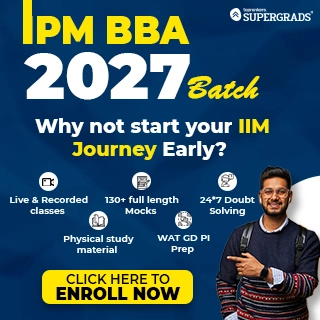Mastering the Art of Skipping for IPMAT 2026
January 27, 2026
Overview: Mastering the Art of Skipping for IPMAT 2026 will boost your exam scores. Focus on answering easy questions first, efficiently manage your time, and enhance your performance. Read to know more.
Unlike the board exam, the IPMAT exam is not an exam where you can score full marks.
The IPMAT exam is a competitive test where your goal should be to maximise your score. That means attempting all the easy questions that you know.
The art of skipping helps you to understand how to skip over the difficult questions and attempt the easy ones to maximise your score.
Let’s learn the tips for mastering the art of skipping for IPMAT for 2026 and boosting your scores.
Table of Contents
What is the Art of Skipping?
Before you learn mastering the art of skipping for IPMAT, let's see what is art of skipping.
Art of skipping is a strategy where you first attempt all the questions that you are 100% sure of getting right.
And not wasting time on questions you can’t answer or doubting getting right.
Although it sounds simple, it is not that easy to apply.
Worry not; this article will tell you strategies you can use to successfully execute the art of skipping the IPMAT exam.
How Does the Art of Skipping Help You?
Strategic time management is the key to mastering the art of skipping for IPMAT 2026.
Most students waste time getting bogged down by difficult questions and lose out on more scoring chances.
By knowing how and when to skip and proceed, you can maximize your performance in the exam and increase your score.
By doing this, you save your precious time.
Skip challenging questions
- If a question is too challenging or time-consuming, don't hesitate to skip it.
- Wasting too much time on one question may deprive you of the opportunity to answer several simpler ones.
Prioritize the easy ones
- Your goal is to get the maximum number of answers correct.
- Begin with the simple questions, as they consume less time and effort, which helps you get into the groove.
- Choosing the easy questions serves as the essence of mastering the art of skipping for IPMAT 2026.
Time manage wisely
- Wishing to skip allows you to optimize your time use and try as many questions as possible within the allotted time.
- Through this, you can gain a huge upper hand over other examinees
Build your confidence
- Getting a string of simple questions right gives you confidence early in the test.
- This confidence can build your concentration and make it simpler to solve moderately challenging questions later.
Check: IPMAT Previous Year Question Papers
Let us Understand the Concept of Mastering the Art of Skipping for IPMAT 2026
Mastering the Art of Skipping is backed by quantifiable results.
Reports have shown that your score can increase by 30 to 35% if Art of Skipping is applied.
It has also shown that your marks can increase by 20 even by answering 5 questions.
What does that mean?
Let’s say you and your friend are writing the exam.
Your friend is going through each question one after one in line, and you are using the mastering the art of skipping for IPMAT to attempt the questions you are 100% sure of.
When you both encounter a tricky question, your friend gets busy solving that particular question while you have to skip to a more straightforward question, leaving the tough one for later.
In such a scenario, your friend will probably miss out on the last questions because of the time limit.
At the same time, you managed to grab all the scores you could.
This way, you manage to grab all the easy scores you can and maximize the score you can get.
Check: Highest Score in IPMAT
Best Strategies When Mastering the Art of Skipping for IPMAT 2026
EMT Strategy
The EMT in EMT Strategy stands for Easy, Moderate, and Tough.
While you are preparing for your IPMAT 2026 examination, you have to classify each question or type of question into the class Easy, Medium, or Tough.
But what are the parameters to classify the questions? Clasification builds your approach to IPMAT questions strategy.
Easy questions
- You can easily solve these problems the moment you read them.
- They are usually founded on principles you have well practiced and are 100% sure about.
- There is no doubt or uncertainty in your mind about the method or the solution.
Moderate questions
- Moderate questions are the ones you believe you can answer, but you are unsure about the correct answer or the method.
- You may understand the Mastering the Art of Skipping for IPMAT, but be unsure of your calculations or method.
Tough questions
- You immediately realize you cannot solve these questions because you are unfamiliar with the concept or haven't practiced enough.
- If you have never been exposed to such questions before, it's always better to identify them early on and make the intelligent choice of skipping them.
It is essential to understand that the classifications of questions can change as you practice more.
After more practice, you might find moderate questions easy or challenging.
The bottom line is that the EMT classification can change depending on the level of your practice.
While using EMT in the examination, you must first solve all the Easy questions.
Then, attempt all the moderate questions once (and leave them if they are wrong) and leave the tough ones for the last when you finish the easy and moderate questions.
This is one of the most essential strategies under the Mastering the Art of Skipping for IPMAT.
Topic Driven Strategy
Target Audience: Students with limited prep time (crash courses) or incomplete syllabus coverage.
Benefit: Allows focusing on familiar topics and maximizing points from them.
Steps:
- Identify your strong areas in the IPMAT 2026 syllabus (topics you're comfortable with).
- Attempt ALL questions from those strong areas first.
- Move on to less familiar topics only after completing stronger sections.
- Consider skipping questions from completely unknown topics to save time.
Combination of Topic-Driven and EMT Strategy
You can combine the two strategies to make it more effective where you answer all the easy questions and fall into your topics' expertise.
Read: How Good is a Score of 200 in IPMAT Examination
Common Pitfalls While Mastering the Art of Skipping for IPMAT 2026
While the strategy of skipping is highly beneficial, there are some common pitfalls that you need to be aware of:
- Overestimation of Ability: Students often misjudge their capability to return to tougher questions, leading to missed opportunities for higher scores.
- Misclassification of Questions: Under exam pressure, it's easy to incorrectly classify a question's difficulty, which can disrupt the entire strategy.
Read more: One-Year Preparation Strategy For IPMAT 2026
Performance Tracking
To ensure you stay in alignment with mastering the art of skipping, it’s crucial to track your performance:
- Use Mock Tests: Regularly timed practice exams will help you see how much time you're saving and whether it’s translating to improved scores.
- Review Results: Analyze which questions you skipped and why. This will help refine your question classification and time management skills.
Adjustment Tips
Based on your tracked performance, you might need to adjust your strategy:
- Reevaluate Difficulty Classifications: If you’re consistently underperforming in a section, consider whether you’re accurately classifying the difficulty of these questions.
- Practice Under Simulated Conditions: Regularly practice with the clock ticking better to simulate the pressures of the actual exam day.
Check: IPMAT Exam Day Instructions 2026
Advanced Techniques
Use these to enhance your mastering the art of skipping for IPMAT strategy:
- Intelligent Guessing: Learn to eliminate wrong answers to make educated guesses more effective.
- Partial Attempts: Sometimes, starting a question can jog your memory, allowing you to solve or partially solve more questions than you initially thought possible.
Psychological Aspect
Managing the mental game is as crucial as mastering the physical one:
- Exam Stress: Skipping tough questions initially can reduce anxiety, as you build confidence by answering more straightforward questions first.
- Maintain Focus: Keep a calm mindset, understanding that not all questions are meant to be answered and that strategic skipping is part of your IPMAT study plan.
Mastering the art of skipping IPMAT is about knowing what to skip, when, and how to skip.
With proper practice and understanding, this strategy can significantly enhance your efficiency and score in the IPMAT, positioning you for success in the competitive field of management education.
When you get acquainted with mastering the art of skipping for IPMAT 2026 exam, you can attempt questions strategically.
Key Takeaways
- Skipping for IPMAT 2026: Prioritize answering questions you're 100% sure about to maximize your score and avoid wasting time on difficult ones initially.
- Use EMT Strategy: Classify questions as Easy, Moderate, or Tough. Answer Easy questions first, then Moderate, and tackle Tough ones last if time permits.
- Track and Adjust: Regularly practice with SuperGrads IPMAT mock tests to track your performance, refine question classification, and adjust your strategy for better accuracy and time management.
- Combine Strategies: Blend Topic-Driven and EMT strategies by focusing on strong areas first and then applying the EMT method to manage time effectively.
- Boost Confidence: Mastering the Art of Skipping for IPMAT allows you to avoid tough questions at the start, reduces stress and builds confidence, helping you stay focused and calm during the exam.
Prepare with: Supergrads IPMAT Online Coaching
Frequently Asked Questions
Is 1 month enough for IPMAT 2026?

What is a good IPMAT 2026 score?

Is IPMAT 2026 for MBA?

Can an average student crack IPMAT 2026?

What is mastering the art of skipping for IPMAT 2026?

How skipping tough IPMAT questions improve your exam strategy?







SHARE